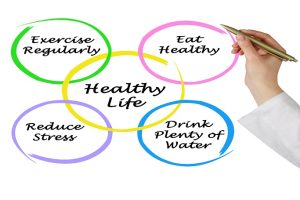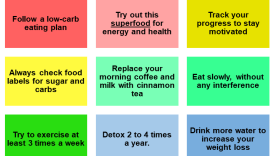Empower Your Health Journey: Tips for a Balanced Lifestyle

Importance of a Balanced Lifestyle
In today’s fast-paced world, maintaining a balanced lifestyle is more critical than ever. A well-rounded approach to health can significantly enhance your physical, mental, and emotional well-being. When individuals embrace balance, they tend to experience increased energy levels, improved mood, and enhanced productivity. Think back to a time when chaos ruled your life: perhaps you disregarded sleep for work or skipped meals for social engagements. By adopting a balanced lifestyle, one can harmoniously integrate various aspects of health—nutrition, exercise, mental health, and rest—creating a more fulfilling life. Here are some pillars of a balanced lifestyle:
- Empower Your Health Journey: Tips for a Balanced Lifestyle
- Importance of a Balanced Lifestyle
- Setting Health Goals
- Nutrition Tips
- Importance of a Balanced Diet
- Superfoods to Include in Your Diet
- Exercise Routine
- Benefits of Regular Physical Activity
- Creating a Sustainable Workout Plan
- Mental Health Practices
- Stress Management Techniques
- Mindfulness and Meditation
- Quality Sleep
- Importance of Sleep for Overall Health
- Tips for Improving Sleep Hygiene
- Hydration and Wellness
- Benefits of Staying Hydrated
- Ways to Stay Hydrated Throughout the Day
- Nutrition: Eating a variety of foods that nurture your body.
- Exercise: Engaging in regular physical activities that you enjoy.
- Mental Health: Incorporating practices that bolster emotional resilience.
- Sleep: Prioritizing rest to allow your body to heal and regenerate.
Setting Health Goals
Setting clear and achievable health goals is the first step down the path to a balanced lifestyle. These goals should be specific, measurable, achievable, relevant, and time-bound (SMART). Consider starting with small, manageable goals that lead to larger ones, reinforcing positive behaviors along the way. For instance:
- Short-term goal: Walk 10,000 steps a day for a week.
- Medium-term goal: Prepare a healthy home-cooked meal three times a week for a month.
- Long-term goal: Complete a 5k run within six months.
By setting these health milestones, individuals create a roadmap to navigate their wellness journey effectively. As one progresses, reflecting on achievements can motivate continued commitment to a balanced lifestyle.
Nutrition Tips
Importance of a Balanced Diet
Following the journey towards a balanced lifestyle, nutrition plays a pivotal role in how we feel and function daily. A balanced diet, rich in essential nutrients, fuels the body’s processes and supports overall health. Without the proper nutrients, you may find yourself feeling fatigued, struggling with concentration, or dealing with mood swings. Imagine trying to run a marathon without training or adequate fuel—similarly, your body needs the right nutrients to operate efficiently. Eating a variety of foods ensures that you’re not only getting what you need but also enjoying the experience. Some key benefits of a balanced diet include:
- Boosting Immunity: Well-nourished bodies are better equipped to fend off illnesses.
- Enhancing Mood: Nutrient-rich foods can significantly affect your mental health.
- Promoting Healthy Weight: A balanced diet helps in maintaining a healthy weight by controlling hunger.
Superfoods to Include in Your Diet
Incorporating superfoods into your diet can provide an extra nutritional punch. These foods are typically high in vitamins, minerals, and antioxidants, supporting various bodily functions. Here are some superfoods you might want to include:
- Quinoa: A complete protein source packed with fiber.
- Blueberries: Rich in antioxidants, they promote brain health.
- Kale: Loaded with vitamins A, C, and K, it’s a great addition to salads or smoothies.
- Chia seeds: These little seeds are excellent for hydration and provide omega-3 fatty acids.
- Sweet Potatoes: High in fiber and vitamin A, they’re a nutritious alternative to regular potatoes.
By integrating these superfoods into your meals, you can enhance your diet further, paving the way for a healthier, more energized life. Remember, small changes can lead to significant improvements in your overall health!
Exercise Routine
Benefits of Regular Physical Activity
As the foundation of a balanced lifestyle continues to take shape, incorporating regular physical activity becomes essential. Engaging in consistent exercise not only helps maintain physical fitness but also reaps numerous health benefits. Consider the last time you felt invigorated after a workout—the rush of endorphins can elevate mood and reduce stress levels. Here are some of the significant benefits of regular physical activity:
- Improved Mood: Exercise releases endorphins, often referred to as “feel-good” hormones, which can alleviate symptoms of anxiety and depression.
- Better Sleep: Regular exercise can promote more restful and deeper sleep, helping you wake up feeling refreshed.
- Increased Energy Levels: A consistent routine can boost stamina and reduce fatigue in daily activities.
- Enhanced Cognitive Function: Physical activity helps in sharpening memory and improving overall brain health.
Making exercise a priority not only improves physical health but also contributes to emotional and mental well-being.
Creating a Sustainable Workout Plan
To reap these benefits, it’s crucial to create a sustainable workout plan tailored to your lifestyle. Rather than setting overly ambitious goals that may lead to burnout, focus on gradual changes. Here’s how to get started:
- Assess Your Current Fitness Level: Consider what types of activities you currently enjoy and how often you exercise.
- Set Realistic Goals: For example, aim for 150 minutes of moderate aerobic activity per week, broken down into manageable segments.
- Mix It Up: Combine various forms of exercise—cardio, strength training, and flexibility workouts—to keep things interesting.
- Schedule Workouts: Treat your workouts as appointments. Set aside time in your day specifically for exercise.
- Listen to Your Body: It’s essential to pay attention to how your body feels and adjust your routine accordingly.
By following these steps, you can create a workout plan that not only fits your lifestyle but also becomes an enjoyable, integral part of your balanced life. Remember, consistency is key, and finding activities you love will make sticking to your plan a whole lot easier!
Mental Health Practices
Stress Management Techniques
As individuals continue their journey toward a balanced lifestyle, prioritizing mental health becomes just as vital as physical health. Stress is a common experience in everyday life, but learning effective stress management techniques can help maintain emotional well-being and promote resilience. Consider those hectic days packed with deadlines and errands. When stress levels rise, it becomes crucial to have strategies in place. Here are some practical stress management techniques:
- Deep Breathing Exercises: Taking a few moments to breathe deeply can help calm the mind and reduce anxiety. Try inhaling for four counts, holding for four, and exhaling for six.
- Exercise Regularly: Physical activity is not only for fitness but also serves as a powerful stress reliever. Even a brisk walk can make a difference.
- Time Management: Break tasks into smaller, manageable steps. This prevents feeling overwhelmed and allows for more control over your schedule.
- Connect with Others: Sharing your feelings with friends or family can provide relief and support during stressful times.
Each of these techniques can be easily incorporated into daily routines, helping individuals navigate life’s challenges more effectively.
Mindfulness and Meditation
Complementing stress management are mindfulness and meditation practices that encourage living in the present moment. These techniques can significantly enhance mental clarity and emotional stability. When was the last time you took a few minutes to simply breathe and be present? Mindfulness encourages observing your thoughts and feelings without judgment, fostering a deeper connection with your inner self. Here are a couple of practices to try:
- Mindful Walking: Focus on the sensations of your feet touching the ground and the sights and sounds around you.
- Guided Meditation: Utilize apps or online resources to follow guided sessions, making it easier to get started, especially for beginners.
Incorporating mindfulness and meditation into daily life fosters a sense of calm and balance, ultimately leading to improved mental health. As you implement these practices, remember that nurturing your mind is just as important as taking care of your body, further enriching your pursuit of a balanced lifestyle.
Quality Sleep
Importance of Sleep for Overall Health
As the journey towards a balanced lifestyle continues, one critical component often overlooked is the quality of sleep. Many may underestimate the profound impact that sleep has on overall health, but it is vital for physical recovery, mental clarity, and emotional stability. Imagine waking up after a restful night, feeling rejuvenated and ready to tackle the day ahead. Quality sleep enhances cognitive function, allowing for better concentration, problem-solving, and creativity. It also plays a significant role in the following areas:
- Physical Health: Sleep promotes muscle repair and recovery, supporting a healthy immune system.
- Emotional Regulation: Adequate sleep helps in managing stress and retains emotional balance.
- Weight Control: Lack of sleep can disrupt hormones that regulate hunger, leading to overeating.
It’s clear that embracing quality sleep is essential for leading a vibrant and productive life.
Tips for Improving Sleep Hygiene
To reap the benefits of good sleep, it’s essential to cultivate healthy sleep hygiene. Fortunately, making some simple changes can drastically improve sleep quality. Here are some effective tips:
- Establish a Routine: Go to bed and wake up at the same time every day, even on weekends. This consistency helps regulate your internal clock.
- Create a Restful Environment: Keep your bedroom dark, quiet, and cool. Consider blackout curtains and white noise machines if needed.
- Limit Screen Time: Reduce exposure to screens at least an hour before bedtime. The blue light emitted can interfere with melatonin production.
- Be Mindful of What You Consume: Avoid heavy meals, caffeine, and alcohol close to bedtime, as they can disrupt sleep patterns.
- Incorporate Relaxation Techniques: Engage in calming activities before bed, such as reading, gentle stretches, or taking a warm bath.
By implementing these strategies, individuals can significantly enhance their sleep quality, leading to better health, improved mood, and a more balanced lifestyle. Remember, quality sleep is not a luxury; it’s a necessity for well-being!
Hydration and Wellness
Benefits of Staying Hydrated
Building on the importance of quality sleep, hydration is another fundamental pillar of a balanced lifestyle that often gets overlooked. Staying hydrated is crucial not just for physical health but also for mental clarity. Imagine feeling sluggish during a mid-afternoon slump—often, dehydration is the underlying culprit! Proper hydration offers numerous benefits:
- Enhanced Physical Performance: Water helps regulate body temperature and keeps joints lubricated, allowing for better performance during physical activities.
- Cognitive Function: Even mild dehydration can negatively impact concentration and alertness. Many people report improved mood and focus with adequate water intake.
- Digestive Health: Staying hydrated aids in digestion and helps prevent constipation.
- Detoxification: Water plays a vital role in flushing out toxins from the body through urine and sweat.
By prioritizing proper hydration, individuals set their bodies up for success, both physically and mentally.
Ways to Stay Hydrated Throughout the Day
To thrive in a well-hydrated state, incorporating strategic habits can make a significant difference. Here are some practical ways to ensure adequate hydration throughout the day:
- Start with Water: Begin each day with a glass of water; it jumpstarts metabolism and hydrates your body after a night’s rest.
- Carry a Water Bottle: Having a reusable water bottle on hand serves as a reminder to drink regularly. Aim for at least eight 8-ounce glasses of water daily, or more if active.
- Infuse with Flavor: If plain water doesn’t excite you, try adding slices of fruits like lemon, cucumber, or berries for a tasty twist.
- Eat Water-Rich Foods: Incorporate fruits and vegetables that have high water content, such as cucumbers, oranges, and watermelon.
- Set Reminders: Use smartphone apps or alarms to remind you to drink water, especially during busy work periods.
By integrating these simple strategies into daily life, staying hydrated becomes effortless. Remember, prioritizing hydration is essential for achieving optimal health and enhancing overall well-being. Keep that water bottle filled and enjoy the benefits of a well-hydrated body!





